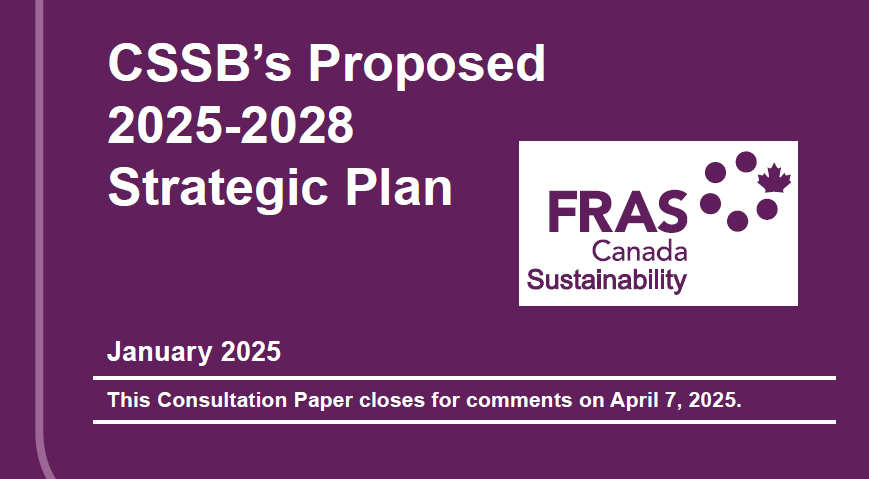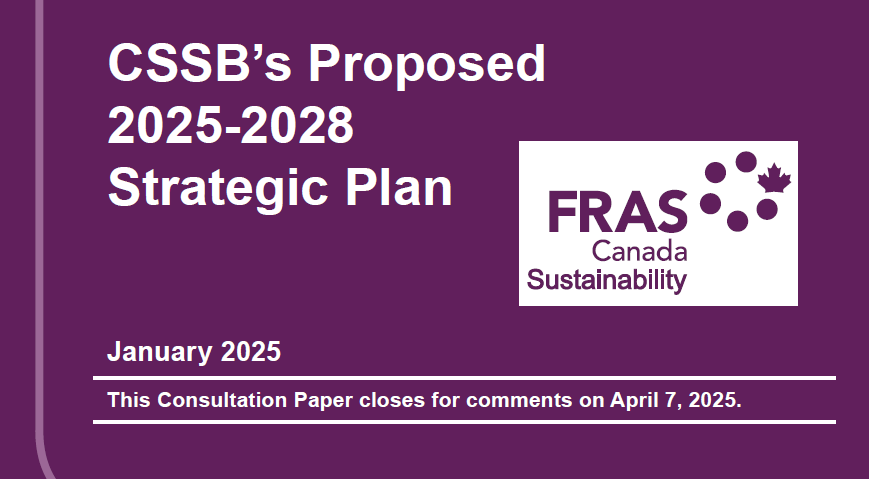CSSB invites the public to provide feedback on the Strategic Plan for 2025–2028
The Canadian Sustainable Development Standards Board (CSSB) is calling on the public to provide feedback on its proposed Strategic Plan for 2025–2028. The plan focuses on improving sustainability reporting through the development of national standards, fostering inclusivity, and contributing to global initiatives. Feedback can be submitted in various formats before the deadline of 7 April 2025.

In January 2025,The Canadian Sustainability Standards Board (CSSB) has introduced its draft Strategic Plan for 2025–2028, outlining key priorities aimed at enhancing sustainability disclosure in Canada. The CSSB is currently seeking public feedback to ensure that the final version of the strategy effectively addresses the diverse needs of stakeholders and supports a robust and impactful reporting process.
How to participate in the discussion
The CSSB invites all interested individuals and organisations to contribute to the discussion of the plan by 7 April 2025. Participation can be done in several ways:
- By completing the online survey on the CSSB website
- Submitting an official letter via a template
- Providing comments through an open letter on the online portal
- Sending written correspondence
These steps will allow stakeholders to fully engage in shaping the strategy and ensuring best practices in sustainability disclosure. After the consultation period concludes, the CSSB will carefully review the feedback received and make adjustments to the strategic plan. The final document will be published by the end of 2025, and its implementation will form the basis for developing new sustainability standards in Canada.
Key priorities of the strategic plan
The draft Strategic Plan of the CSSB focuses on five key areas that align with the current challenges and unique situation of sustainability in Canada, while ensuring integration with global initiatives.
Priority A – CSSB as Canada’s benchmark for sustainability
The CSSB aims to establish its standards (CSDS) as benchmarks for sustainable disclosure, harmonised with international ISSB standards. In recent years, there has been an increase in the availability of quality standards; however, this fragmentation has created challenges in achieving independent disclosure. The CSSB seeks to overcome these barriers by ensuring secure agreements for disclosure and strengthening collaboration with other Canadian provinces to improve auditing and standard consolidation. The implementation of this priority also involves active engagement with stakeholders and expanding voluntary standards.
Priority B – Inclusivity in the development process
The CSSB is committed to ensuring that the standardisation process is inclusive and takes into account the diverse cultural and social contexts of Canada. The inclusion of elders, youth, and women in consultative processes, as well as the development of culturally appropriate methods for working with these groups, plays a crucial role in ensuring the reliability and completeness of the standards. In 2024, the CSSB published a report titled "Indigenous Matters: What We Heard", emphasising its commitment to transparency and accountability.
Priority C – Participation in the development of international standards
The CSSB is actively involved in international initiatives to ensure that Canada's approaches align with global practices, addressing biodiversity and other significant environmental parameters. This cooperation aims to strengthen Canada's position in international processes and support the establishment of harmonised standards globally.
Priority D – Development of additional standards and guidelines
The CSSB is also focusing on creating standards and guidelines for small and medium-sized enterprises, as well as the healthcare sector. This will help ensure a unified approach to sustainability disclosure across different sectors of the economy, even for organisations that do not support the implementation of the core CSDS 1 and CSDS 2 standards.
Priority E – Communication and public engagement
The CSSB intends to enhance its transparency and improve engagement with the public by conducting post-implementation reviews to incorporate feedback and expanding informational and educational initiatives, including work with Francophone communities. This activity will help improve understanding of the importance of the standards and ensure accessibility of information for all stakeholders.
Strategic Insights and Benefits for Business Sustainability
The CSSB’s Strategic Plan for 2025–2028 is focused on establishing an effective and inclusive sustainability disclosure system that aligns with both national and international standards. This strategy will involve a wide range of stakeholders, including businesses, regulatory bodies, and civil society, to ensure a transparent, inclusive, and comprehensive process for sustainability reporting in Canada.
For businesses, the plan offers significant benefits and opportunities, including:
- Standardisation and Harmonisation: The development of standardized and harmonised sustainability reporting frameworks that enhance the consistency, reliability, and comparability of disclosures across sectors. This will help businesses meet both national and international reporting requirements, ensuring they stay ahead of global trends.
- Enhanced Credibility: By aligning with global best practices, businesses will enhance their credibility with investors, consumers, and other stakeholders. As demand for transparency and accountability grows, businesses that adopt these standards will gain greater trust and recognition in the market;
- Internal Reporting and Efficiency: The adoption of these standards will help businesses streamline their internal reporting processes, ensuring better data collection, analysis, and decision-making. This, in turn, will improve operational efficiency and effectiveness;
- Sector-Specific Guidance: The plan includes provisions for developing tailored guidance for specific sectors, such as small and medium-sized enterprises (SMEs) and healthcare, helping them address their unique challenges in sustainability reporting;
- Long-Term Value Creation: By implementing the CSSB's standards, businesses will be better positioned to identify opportunities for long-term value creation, contributing to a sustainable and resilient economy;
- Improved Collaboration: The plan encourages increased collaboration between the private sector, government, and civil society, facilitating a cooperative approach to sustainability. This can lead to shared learning and innovative solutions to global challenges.
Ultimately, the CSSB’s strategic plan will create a more sustainable and inclusive economy, enabling businesses to navigate challenges, contribute positively to society, and build a better future for all.



